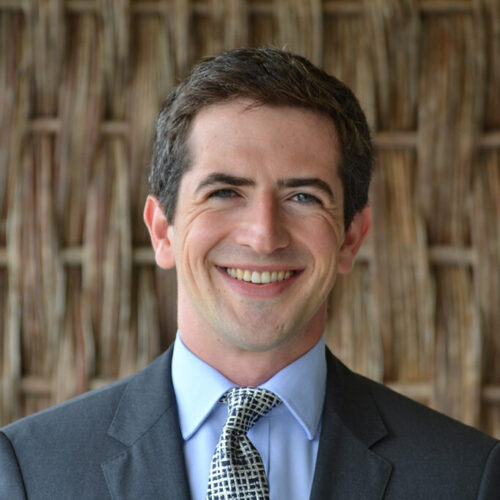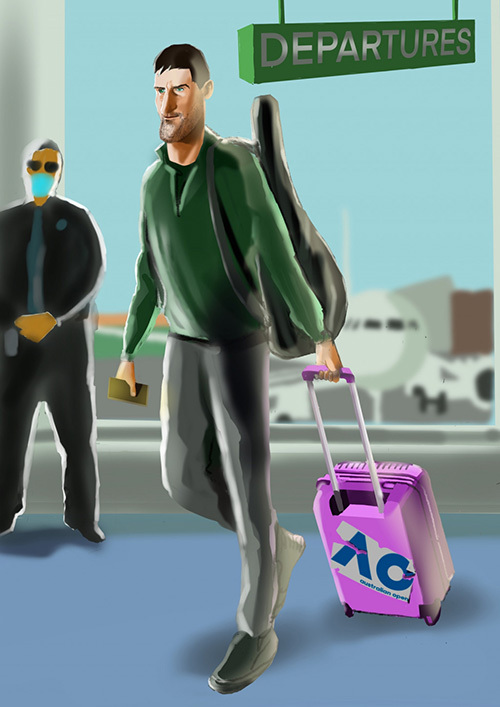
On Sunday, 16 January 2022, following an originating application lodged on a Friday evening, transferred to the Federal Court of Australia overnight, referred to the Full Court on Saturday morning, and listed for final hearing the following day, the Full Court of the Federal Court dismissed a challenge to a decision of a federal minister that prevented tennis player Novak Djokovic from competing in the Australian Open tennis championship, which commenced on 17 January 2022.
Background
Djokovic’s visa had first been cancelled under s 116(1)(e)(i) of the Migration Act 1958 (Cth) (Act) at Melbourne Airport on Thursday, 6 January, by a delegate of the minister for home affairs. Djokovic had been granted a Class GG subclass 408 Temporary Activity visa, to enable him to compete in the Australian Open. Following that cancellation decision, he was taken into immigration detention, where he remained for the duration of the weekend.
The cancellation decision was overturned by Judge Kelly of the Federal Circuit Court of Australia (FCFC) on Monday, 10 January 2022, following a concession by the minister for home affairs that Djokovic had been denied procedural fairness in the making of the decision.
On Friday, 14 January, the minister for immigration, citizenship, migrant services and multicultural affairs (minister) cancelled Djokovic’s visa again, this time under s 133C(3) of the Act. The rules of natural justice do not apply to decisions under that provision. Djokovic again applied to the FCFC for an order quashing the decision. Judge Kelly transferred the proceeding to the Federal Court of Australia (FCA): [13].
The chief justice of the FCA directed that the court’s original jurisdiction in the matter be exercised by a Full Court. The application was heard on Sunday, 16 January.
On the same day, the court ordered that the application be dismissed, with reasons to follow.

Relevant provisions of the Migration Act
Section 116(1)(e)(i) of the Act provides that the minster may cancel a visa if he or she is satisfied that ‘the presence of its holder in Australia is or may be, or would or might be, a risk to … the health, safety or good order of the Australian community or a segment of the Australian community …’. Section 133C(3) confers a personal power of cancellation, if the minister is satisfied that a ground of cancellation under s 116 exists, and the minister is satisfied that it would be in the public interest to cancel the visa.
The minister’s decision
The minister provided reasons for his decision. He was satisfied that Djokovic’s presence in Australia ‘may be a risk to the health of the Australian community’: [53], and that the Serb’s presence ‘may be a risk to the good order of the Australian community’: [64]. Thus being satisfied of matters identified in s 133C(3)(a), the minister was, additionally, satisfied of the matter in s 133C(3)(b), namely, that ‘it would be in the public interest to cancel the visa: [68].
Risk to public health
The minister provided reasons for his decision. He was satisfied as to the risk to community health on the basis of evidence of four matters: (1) the health impacts of the COVID-19 pandemic in Australia; (2) the efficacy of vaccines in addressing those impacts; (3) Djokovic’s perceived or actual ‘opposition to becoming vaccinated against COVID-19’: [53]; (4) the possible influence of that perceived or actual opposition on members of the Australian community.
The third and fourth factors were a focus of the parties’ argument. As to third, the minister noted that Djokovic was a ‘high profile unvaccinated individual who has indicated publicly that he is opposed to becoming vaccinated against COVID-19
…. [Djokovic] has previously stated that he ‘wouldn’t want to be forced by someone to take a vaccine’ to travel or compete in tournaments’: [53]. The minister referred to a report that, in April 2020, Mr Djokovic said that he was ‘opposed to vaccination’: [72]. Djokovic was reported to have stated that he was ‘no expert’, and that he would ‘keep an open mind’. He was also reported to have stated that he wanted to have ‘an option to choose what’s best for my body’. He was reported to have stated that he ‘wouldn’t want to be forced by someone to take a vaccine’ to travel or compete in tournaments: [72].
As to the fourth factor, the minister reasoned that Djokovic’s presence in Australia may
foster anti-vaccination sentiment leading to (a) other unvaccinated persons refusing to become vaccinated, (b) other unvaccinated persons being reinforced in their existing view not to become vaccinated, and/or (c) a reduction in the uptake of booster vaccines.
The minister also considered evidence that Djokovic had previously disregarded public health measures purporting to address COVID-19, by attending a media interview after a positive COVID-19 test result and by failing to wear a mask while a photo was taken. The minister stated,
his behaviour may encourage or influence others to emulate his prior conduct and fail to comply with appropriate public health measures following a positive COVID-19 test result, which itself could lead to the transmission of the disease and serious risk to their health and others: [58].
Risk to good order
The minister’s reasons for being satisfied that Djokovic’s presence ‘may be a risk to the good order of the Australian community’ were threefold (at [64]).
First, Djokovic’s presence in Australia ‘may encourage other persons to disregard or act inconsistently with public health advice and policies in Australia’. Secondly, Djokovic’s ongoing presence might lead to an ‘increase in anti-vaccination sentiment generated in the Australian community’ and potentially lead to an ‘increase in civil unrest’ with ‘rallies and protest’, that may themselves ‘be a source of community transmission’.
Thirdly, he considered there may be a risk of an ‘adverse reaction by some members of the Australian community’ to Djokovic’s presence in Australia on the basis of their ‘concerns about his unvaccinated status and his apparent disregard for the need to isolate following the receipt of a positive COVID-19 test result’, and these ‘opposing reactions may themselves be a source of discord’ and ‘public disruption’.
The minister expressly referred to the judgment of Goldberg J in Tien v Minister for Immigration and Multicultural Affairs (1998) 89 FCR 80 at 93-94, where his Honour had explained the phrase ‘good order’ as involving ‘something in the nature of unsettling public actions or activities’ (at [64]).
Public interest
The minister arrived at his state of satisfaction that it was in the public interest to cancel Djokovic’s visa on four bases (at [65]). First, he considered Djokovic’s ‘well- known stance on vaccination … creates a risk of strengthening the anti-vaccination sentiment of a minority of the Australian community. Secondly, he noted the substantial costs associated with treatment of those affected by COVID-19. Thirdly was that cancellation of Djokovic’s visa would, in light of his ‘stance on vaccination and acknowledged failure to follow precautionary measures following receipt of a positive COVID-19 test result’, be consistent with ‘the Australian Government’s strong stance on the benefits of vaccination and appropriate measures directed to managing the COVID-19 pandemic.’. Fourthly, he relied on the health and good order factors already noted above.
The grounds of Djokovic’s application
Djokovic raised three grounds of review. First, that the minister’s decision was illogical, irrational or unreasonable, because the minister did not consider the effects on anti-vaccination sentiment if Djokovic’s visa was cancelled. Second, that the minister had no evidence that supported his finding that Djokovic’s presence in Australia may ‘foster anti-vaccination sentiment’. Third, that it was not open to make findings about Djokovic’s stance on vaccination in circumstances where the minister did not seek Djokovic’s views, the sole relevant evidence before the minister was a report of qualified comments by Djokovic in April 2020, and there was no evidence of him expressing any views at any time since then.
Decision
The court rejected each of the three grounds of Djokovic’s application. The court stressed that for the purposes of s 133C of the Act, the inquiry was not in relation to ‘the fact of Mr Djokovic being a risk to the health, safety or good order of the Australian community; rather it is whether the minister was satisfied that his presence is or may be or would or might be such a risk’: [20]. In reaching the requisite state of satisfaction, the minister had to consider ‘what may or might happen in the future by reference to the presence of the visa holder in Australia’: [38].
In dismissing ground 1, the court pointed to the words of s 133C, which ‘direct attention to the ‘presence’ of the visa holder in Australia’: [95]. Accordingly, ‘[n]o statutory obligation arose to consider what risks may arise if the holder were removed from, or not present in, Australia.’: [95]. The court also cited with apparent approval Goldberg J’s explication of the meaning of ‘good order’ in Tien (at [40]) (this being the first adoption of Tien by a full court).
The court dismissed ground two because it was open to the minister to infer ‘that it was perceived by the public that Mr Djokovic was not in favour of vaccinations’: [79]. There was material that appeared to demonstrate that ‘anti-vaccination groups had portrayed Mr Djokovic as a hero and an icon of freedom of choice in relation to being vaccinated’: [79]. Further, even ignoring ‘anti-vaccination groups’, the minister was entitled to conclude that there was a ‘possible influence’ ([82]) on a second group, comprising ‘people who may simply be uncertain or wavering as to whether they will be vaccinated’: [80]. The influence of an ‘iconic world tennis star’ in this regard ‘comes from common sense and human experience’: [82]. Further, it was ‘not irrational for the minister to be concerned that the asserted support of some anti-vaccination groups for Mr Djokovic’s apparent position on vaccination may encourage rallies and protests that may lead to heightened community transmission’: [85].
As to ground 3, the court held that it was ‘plainly open to the minister to infer that Mr Djokovic had for over a year chosen not to be vaccinated since vaccines became available’: [74]. Further, ‘[i]t was plainly open to the minister to infer that Mr Djokovic had chosen not to be vaccinated because he was opposed to vaccination or did not wish to be vaccinated.’: [74]. And ‘[i]t was also open to the minister to infer that the public would view his attitude as the media had portrayed: that he was unwilling to be vaccinated’: [76].
For a variety of reasons this matter attracted a lot of attention. Its legal significance is to serve as a reminder of the width of the power vested in the minster to cancel a visa under s 133C(3), and to confirm the broad construction given to the phrase ‘good order’ in s 116(1)(e) by Goldberg J in Tien. BN
